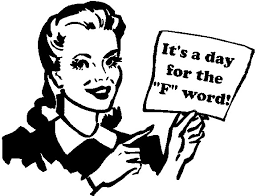The ‘F’ Word
Has anyone noticed how frequent the use of the F word has become these days, especially on the social media? Or is this question redundant because you too are a frequent user?
There was a time when people would cringe on hearing this word spoken in public. Obviously we have become stronger now and it takes a lot more than the F word to make us cringe!
But on a serious note, why this enhanced propensity in society for the use of the F word?
The conclusion I have come to is that profanity in general and the F word in particular, in verbal or written communication, is used by people to give the impression that they are liberal, or ‘modern’, or even more daring or more important than you, who flinches even if subconsciously, when someone resorts to unbridled swearing.
Yes siree, the frequent or habitual user of profanity more often than not wishes to create, even if subconsciously, a certain feeling of inferiority in you. Whereas you, unless you have a strong vested interest to be served by pretending to be awed by that person’s profane ranting, will hopefully reach the conclusion, even if in your deep subconscious, that this person is best kept at an arm’s length, if not avoided altogether.
Will I be considered a male chauvinist, or even a misogynist if I say that I have always felt somewhat revolted when women utter the proverbial 4 letter F word? Maybe I am just ‘old-fashioned’ that way, conditioned to think of women as genteel and discreet, in their mannerisms as much as in their speech. Surely such a thought-process is a compliment to womankind rather than an attack on their ‘empowerment’ or a slight at their universal demand of equality of the genders in every possible way?
To supplement the above, I must also say that I also have a distaste for men using the F word in mixed company, or even in an all-male company where the people present have relatively formal relationships with each other, or are meeting for the first time. Uttering the F word with abandon is something one should reserve for the company of close, intimate friends. The ironic thing is that the F word does have a huge depth in terms of its possible usage, and quite often sums up a situation or serves as an expression of one’s feelings at a particular point in time, like perhaps no other single 4 letter word can!
Also to be noted is how this single word can convey a huge diversity of emotions depending on how it is uttered. In this sense it really belongs to a phonetic language like Chinese, in which there are innumerable words, each meaning several different things depending on how it is said –
short and quickly, drawn out, one syllable short and the other drawn out and so on.
Similarly the F word can quite aptly convey any of several emotions, depending, as said earlier on how it is delivered – the pitch, intonation, decibels, etc, all combine to communicate extremely precisely a specific feeling – shock, disgust, anger, surprise,disdain, joy, pleasure, merriment, awe, fear, wonderment, hopelessness, certainty, camaraderie, rejection, acceptance (as in F—K Yes!) …. the list is endless! Let’s see if you can add to this list by way of a comment on this post.
In this respect I wonder if the equivalent word of the F word in other languages has quite the same versatility? The same impact to capture a particular situation or a specific reaction or emotion at a particular point in time? Now Urdu, being a much younger language than English, is remarkably well-endowed in its collection of expletive words and phrases, even if most are colloquial or slang. And some of these words, especially those used to sum up a person wholly in one single word, are astonishingly descriptive and all-encompassing. Yet there is no Urdu equivalent of the English 4 letter F word. Maybe an equivalent exists in other languages that have the same base or origin as English. Not to worry. Not something to delve in here beyond this observation.
On a related note, there was this video being shared on social media some time ago (several years ago?), on just this – the vast usage possibilities or different connotations of the F word in human speech. It has to be one of the most hilarious videos I have ever seen. If you missed it, it is highly recommended that you find it on the Net and see it. Two things are guaranteed – you will end up viewing it several times, and you will split your sides laughing out loud. It’s called A lesson on the word F—K, Sharon one-vibration, for whatever reason. But whoever conceived this has to be a creative genius! Caution: not to be viewed in front of anyone below the legal age or of strictly puritanical bent of mind!
So after what would appear to be eulogizing the F word, I must state that my personal dislike of usage of expletives or profanity, by men or women, is not restricted to the usage of the F word alone and applies to practically all expletives, in any language. My attitude to profanity is well captured in all of the below quite insightful quotations:
“Profanity is the common crutch of the conversational cripple.” David Keuch.
“When a man uses profanity to support an argument, it indicates that either the man or the argument is weak – probably both.” Unknown.
“Profanity is the attempt of the lazy or feeble mind to assert itself forcefully.” Unknown.
“Profanity is the weapon of the witless.” Unknown.
So let’s end with an invitation to think of other F words that are exciting, intriguing, expressive and great to use, both in verbal and written communication. Without thinking too much about it, here are ten F words from the top of my head, in no particular order:
Frenzy, frivolous, fastidious, facile, farcical, feckless, feisty, fatalistic, frenetic, and one of my favourite words – flamboyant!
There you go. Some quite expressive F words for you. Go on, test your mental vocabulary and spend a few quick minutes by adding more F words to these. And no one is restricting you to just 4 letter F words!



Leave a Reply